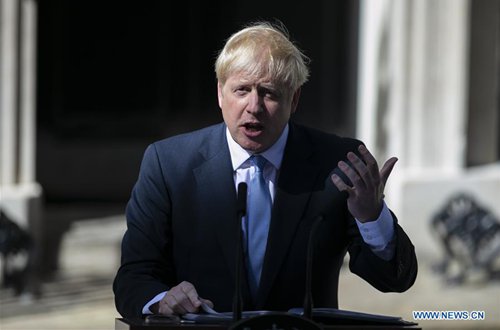HOME >> WORLD
British PM says to call general election after defeat in parliament
Source:Xinhua Published: 2019/9/4 11:17:44

Newly elected Conservative Party leader and British Prime Minister Boris Johnson speaks at 10 Downing Street in London, Britain, July 24, 2019. Newly-elected Conservative Party leader Boris Johnson took office as the British prime minister on Wednesday amid the rising uncertainties of Brexit. The latest development came after Theresa May formally stepped down as the leader of the country and Johnson was invited by the Queen to form the government. (Photo: Xinhua)
British Prime Minister Boris Johnson announced Tuesday night he would be calling a general election if MPs vote for a no-deal Brexit on Wednesday.
His dramatic statement came after MPs voted by 328 to 321 to put forward an emergency bill Wednesday to block Johnson from taking Britain out of the European Union (EU) on Oct. 31 without a deal.
Johnson said if MPs vote for the no deal bill, the only way forward would be for the people to decide.
He said: "Let there be no doubt Parliament is on the brink of wrecking any deal with Brussels."
An election could take place on Oct. 14, but no potential date has yet been agreed.
Addressing a packed House of Commons, Johnson said he does not want an election but if MPs vote for the no-deal bill on Wednesday the public will have to choose who goes to Brussels on Oct. 17.
"If Jeremy Corbyn (the Labour leader) goes to Brussels, he will do what the EU wants," he said, adding that if he goes, he will get a deal from the EU.
Rebel Conservative MPs had been warned ahead of the vote they would be kicked out of the party if they voted against the government. But it was confirmed by Business Secretary Andrea Leadsom that the rebels would be given a second chance to vote with the government during the Wednesday debate.
It they are suspended from the party, it would prevent them from standing as Conservatives in the general election.
During a day of high drama, as MPs returned to Westminster after their long summer break, Johnson suffered a blow when one of the Conservative MPs, Phillip Lee, defected to the minority Liberal Democrats.
His departure from the Conservative benches meant Johnson's government no longer has even its majority of one in the House of Commons.
If the emergency no-deal bill passes through both houses of parliament and receives Royal consent from Queen Elizabeth this week, it will halt Britain's planned departure from the EU on Oct. 31 unless there is a deal between Britain and Brussels.
Supports say the move is seen as potentially the last opportunity for MPs to prevent Britain leaving without a deal.
As MPs debated, hundreds of protesters chanting "stop the coup" marched past the Houses of Parliament. They blocked the road alongside the famous building, from Parliament Square to College Green in Westminster. Some held smoke-bombs as they shouted their messages.
It was a reaction to Johnson's decision to prorogue, or close down parliament next week for five weeks.
The debate Tuesday night was generated by Conservative rebel MP Oliver Letwin who said it would provide the government with the time to seek to solve the Brexit problem and enable parliament to help resolve an issue which has proved very difficult.
The bill to be debated Wednesday would pave the way for a Brexit extension to Jan. 31 if no deal with the EU is agreed by then.
In a noisy debate in the famous wood-panelled chamber, the Conservative Leader of the House of Commons Jacob Rees-Mogg accused MPs wanting to block a no-deal Brexit of deliberately attempting to allow an extension long enough to allow a second piece of legislation, or to allow Brexit to be scrapped altogether.
Jeremy Corbyn, leader of the main opposition Labour Party, denied the emergency bill was not an attempt to reverse Brexit.
Corbyn said the bill, if passed this week, is about providing "vital breathing space" to allow MPs to find a way through "this mess".
The latest YouGov opinion poll continues to put Johnson's Conservatives ahead. Of people quizzed for the poll, 35 percent said they backed the Conservatives, a 2 percent rise over last week. The main opposition Labour Party has seen its share also go up by 3 percent to 25 percent. The minority Liberal Democrats, according to the poll, would see their share drop from 21 percent to 16 percent.
Posted in: EUROPE